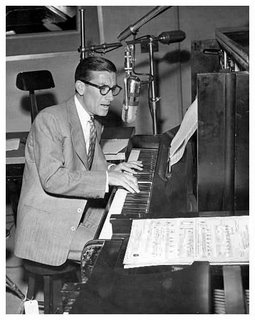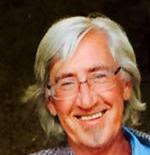DECEMBER 27: A HOAGY CARMICHAEL DATE

Post-Christmas Greetings. Today marks the 25th anniversary of the death of Hoagy Carmichael (in Rancho Mirage, California, at the age of 82). He composed 'Memphis in June', namechecked by Dylan in his 1985 release 'Tight Connection to my Heart', but there are sufficient further loose connections to Dylan's heart to make for an entry on Carmichael in The Bob Dylan Encyclopedia. Here it is:
Hoagy Carmichael was born Hoagland Howard Carmichael on November 22, 1899 and raised in Bloomington Indiana. He grew up to be a singer and actor but primarily a popular songwriter. His very first composition was called ‘Freewheeling’, and he also wrote a song titled ‘Things Have Changed’. More famously he wrote or co-wrote, among many, many others, ‘Stardust’ and ‘Georgia On My Mind’.
Carmichael is one of the many improbable people whose work and persona Dylan admires, possibly just to be perverse. Hoagy’s photo is pinned up on the wall of the shack behind him on the photo by DANIEL KRAMER planned for the US hardback of Dylan’s Tarantula but rejected (it’s reproduced in Kramer’s book Bob Dylan) and in the Empire Burlesque song ‘Tight Connection To My Heart’ Dylan names a Hoagy Carmichael composition. Dylan sings: ‘Well, they’re not showing any lights tonight / And there’s no moon. / There’s just a hot-blooded singer / Singing “Memphis in June”’.
'Memphis In June’ was composed by Carmichael with lyrics by Johnny Mercer (who also wrote the lyric to ‘Moon River’, which Dylan sang one night on the Never-Ending Tour in tribute to the late STEVIE RAY VAUGHAN). Dylan’s ‘hot-blooded singer’ is a neat small joke about Hoagy, whose many assets include a calculatedly lizard-like presence. It was a joke Dylan had retained from an earlier version of the song, then called ‘Someone’s Got A Hold Of My Heart’, which he’d recorded at the sessions for Infidels, the album before Empire Burlesque. Several performances of this have floated around, but the one eventually released officially, on The Bootleg Series Vols. 1-3 in 1991, offered these alternative lines: ‘I hear the hot-blooded singer / On the bandstand croon / “September Song”, “Memphis in June”’. Clearly Dylan was determined to retain Hoagy, whatever other changes he made. (‘September Song’ was written by Maxwell Anderson and composed by Kurt Weill for the 1938 Broadway play Knickerbocker Holiday.)
‘Memphis’ was written for the 1945 George Raft film Johnny Angel, in which Carmichael played a philosophical singing cab driver. (‘After that I was mentioned for every picture in which a world-weary character in bad repair sat around and sang or leaned on a piano’). Subsequent film roles included being the pianist who sings ‘Hong Kong Blues’ in the Bogart-Bacall film To Have And Have Not, one of Dylan’s favourite hunting-grounds for lyrics in the Empire Burlesque period.
The least hot-blooded cover version of ‘Memphis In June’ may be by Matt Monro, from 1962; the best (and ‘on a bandstand croonin’’) may be by Lucy Ann Polk, cut in July 1957 in Hollywood. Hoagy himself recorded the song in 1947 with Billy May & His Orchestra and again in 1956 with a jazz ensemble that included Art Pepper.
Carmichael and Mercer also wrote that great song ‘Lazy Bones’ - in twenty minutes, in 1933 - which was revisited magnificently in the 1960s by soul singer James Ray (who made the original US hits of ‘If You Gotta Make A Fool Of Somebody’ and ‘Itty Bitty Pieces’; in the UK he was unlucky enough to find these savaged in unusually distressing ways, even by the standards of British cover versions of the time, by Freddie & The Dreamers and Brian Poole in the first case and by The Rockin’ Berries and Chris Farlowe in the second).
Carmichael played ranch-hand Jonesey in the 1959-60 season of the TV series Laramie. In 1972 he was given an Honorary Doctorate by Indiana University back in Bloomington (which is where BETSY BOWDEN got her doctorate for a study of Bob Dylan’s performance art that became her book Performed Literature).
Hoagy Carmichael died two days after Christmas, 1981. When a retrospective 4-LP box set of his work, The Classic Hoagy Carmichael, was issued in 1988, with copious notes by John Edward Hasse, Curator of American Music at the Smithsonian Institution, it was released and published jointly by the Smithsonian and the Indiana Historical Society. (American hobbyists are so lucky: there’s always plenty of places to go for funding. Imagine trying to get funds to research, compile and write an accompanying book about Billy Fury from the British Museum and the Birkenhead Historical Society.) The Carmichael box-set notes say this, among much else, and might just remind you of someone else (not Billy Fury):
‘At first listeners may be distracted by the flatness in much of Carmichael’s singing, and turned off especially by his uncertain intonation. The singer himself said, “my native wood-note and often off-key voice is what I call ‘Flatsy through the nose’”. But... one becomes accustomed to these traits and grows to appreciate and admire other qualities of his vocal performances, specifically his phrasing... intimacy, inventiveness and sometimes even sheer audacity. Also, many... evidence spontaneous and extemporaneous qualities, two important ingredients in jazz.’
[Hoagy Carmichael: The Classic Hoagy Carmichael, 4-LP set compiled & annotated by John Edward Hasse; issued as 4 LPs or 3 CDs, BBC BBC 4000 and BBC CD3007, UK, 1988; Johnny Angel, dir. Edwin L. Marin, written Steve Fisher, RKO, US, 1945. Daniel Kramer: Bob Dylan, New York: Citadel Press edn, 1991, p.127. Betsy Bowden: Performed Literature, Bloomington: Indiana University Pres, 1982.]















9 Comments:
Dear Mr. Gray,
thanks a lot for this post. But I must admit I do not quite understand why Hoagy Carmichael is called "one of the many improbable people whose work and persona Dylan admires, possibly just to be perverse". "Improbable"? I think Dylan himself had much more understanding and respect for songwriters and singers of the generation before. He had grown up with that kind of music and I don't doubt that he has learned much from them.
Another Dylan quote mentioning Hoagy:
"None of my songs are that good, it's the way they're performed, that's what it is. Hoagy Carmichael songs are much better than mine, so are George Gershwin's and Irving Berlin's, too" (Elliott Mintz Interview for Westwood Radio, 1991)
The music of "Hazel" might be inspired by "Georgia On My Mind", both songs share the opening chord sequence I/III (F/A in the key of F). Dylan surely knew the Ray Charles version, but this song was also in the repertoire of the "Band".
I also think that the song "New Morning" is loosely based on some ideas from "Lazy River". Generally the songs on the LP "New Morning" show traces of influence from the peaceful small town nostalgia of Hoagy Carmichael and maybe Johnny Mercer.
http://www.morerootsofbob.com/Songs/New_Morning/new_morning.html
All The Best
LostChords
Can I agree with Lost Chords that the comments in the Dylan Encyclopedia on such brilliant musicians and lyricists asCarmichael, Rogers and Hart and the Gershwins are both patronising and profoundly unfair.
It is refreshing to see that Bob has no time for the kind of hip snobbery displayed there.
Any aspring lyricist could do a lot worse than study the lyrics by Hart, for example, whose "My Funny Valentine" and "Mountain Greenery" are a million miles away from the 'middle class dinner-dance ennui' that you mention in your glib dismissal of the Gershwins.
The same, of course, goes for masterpieces like Cole Porter's "love for Sale' and "Every Time we say Goodbye'
For a much more perceptive and interesting discussion of Dylan's relationship to the Gershwins than you provide, you could look at
http://hummingadifferenttune.blogspot.com/2009/02/bob-dylan-and-gershwins_14.html
The comments on the Gershwins in the Encyclopedia seem tome to pint to a wider problem with recurs in your writings on Bob.
The problem as I see it is that you have a number of blind spots - in relation to country music, English folk, the tin-pan-alley tradition - which makes it difficult for you to assess the influence f such styles on Dylan's work.
Bob's eclecticism, by contrast, is very refreshing, as is his detailed knowledge of music history.
Of course, it is healthy, as a young person, to have disdain for the music of your parent's generation. this helps breed creativity and innovation but when this is carried into middle age it becomes more fatuous than enlightening.
Surely one can appreciate the qualities of Alexander Pope, for example, while at the same time liking Keats..
Michael
Suggest you do yourself a great favour & go quickly to your nearest cd shop & buy this cd:
We'll Have Manhattan: Rodgers & Hart Songbook.
Listen regularly and see what a great songwriter combined with a great lyricist and superb performers can achieve.
Listen particularly to Bing Crosby version of 'Mountain Greenery' - Dylan has talked about his admiration for Bing Crosby's phrasing & this is one of the finest examples of it.
Listen then to Chet Baker's version of 'My Funny Valentine' which is among the greatest records ever made and brings out the innate melancholy which was a feature of LorenzHart's best work.
Then lose the tired cliches about 'complacent sophistication' and 'middle class dinner dance ennui' which are about as useful and interesting as the line that 'Dylan cant sing'.
Michael
Re-reading your entryon Elvis, I came across the great Holden Caufieldesque line about his compensating 'for the false posturing of everything in the pre-Dylan years.' 'Everything?- Wow. There is a great line by Raymond Williams somewhere in a piece about Dickens where he says that the belief that one has seen through everything is the characteristic pose of the adolescent.
So Bob really was the Messiah...
I loved the line about Sinatra & Crosby's complete 'absence of passion as well'...
Suggest you listen to Sinatra's 'I am a fool to want you' & repeat that nonsense.
Also have lost count of the number of musical styles that Dylan 'was born to abolish' - it sounds as if he is more of a musical 'terminator' than anything else.
You could also listen to Sinatra's version of Ebb Tide, which Dylan describes in Chronicles:
"I used to play the phenomenal 'Ebb Tide' by Frank Sinatra a lot and it had never failed to fill me with awe. The lyrics were so mystifying and stupendous. When Frank sang that song, I could hear everything in his voice – death, God and the universe, everything."
I have also thought that 'Its all over now, Baby Blue' was influenced by the Rodgers & Hart's song "Little Girl Blue'. The song was in Nina Simone's repertoire, which, I think, may have been where Bob picked up on it.
By the way, there is a good biography of Hoagy by the Jazz musician, Richard Sudhalter (Stardust Melodies).
In it, he argues that Hoagy (and his friend and sometime collaborator Johnny Mercer) shared 'a longing for an idealized America outside the burgeoning cities' and that, in their songs, they recreated this 'imaginary landscape' of a pre-industrial America.
It seems to me that it is precisely this quality in their work (and Hoagy's wit which shines through songs like "Lazy Bones' and "Small Fry') that appeals to Bob & has influenced the musical direction he has taken from "Love and Theft' onwards.
By the way, Hoagy (one of the great American songwriters) should not be mentioned in the same breath as Tommy Steele.
Post a Comment
<< Home